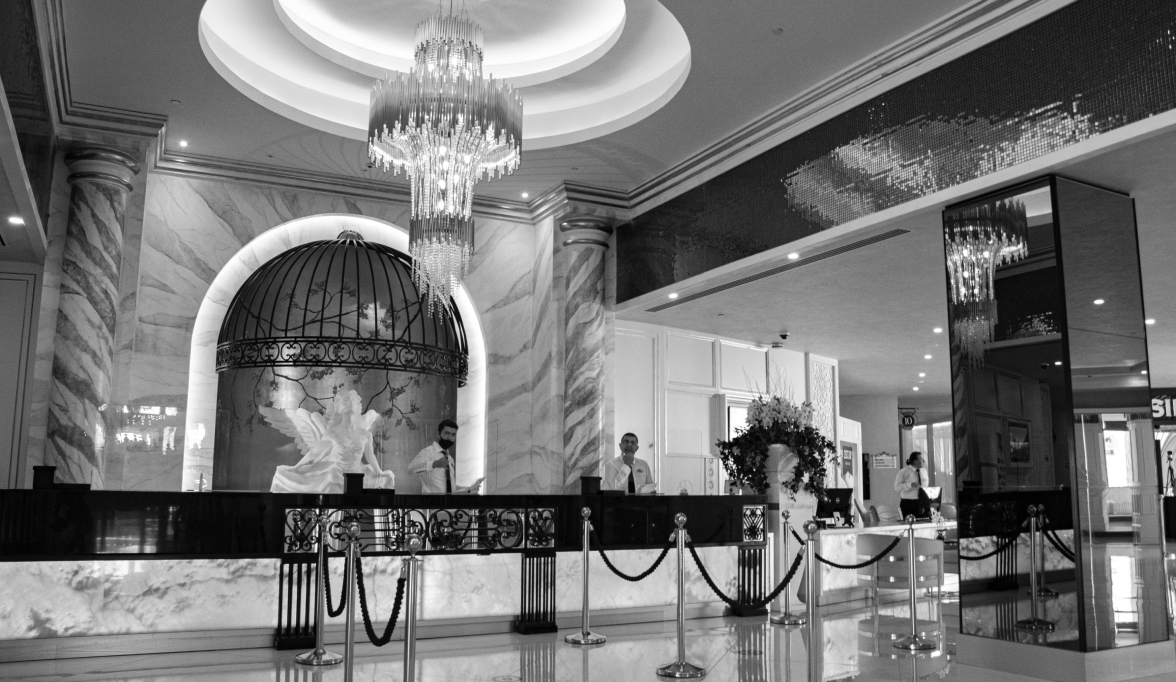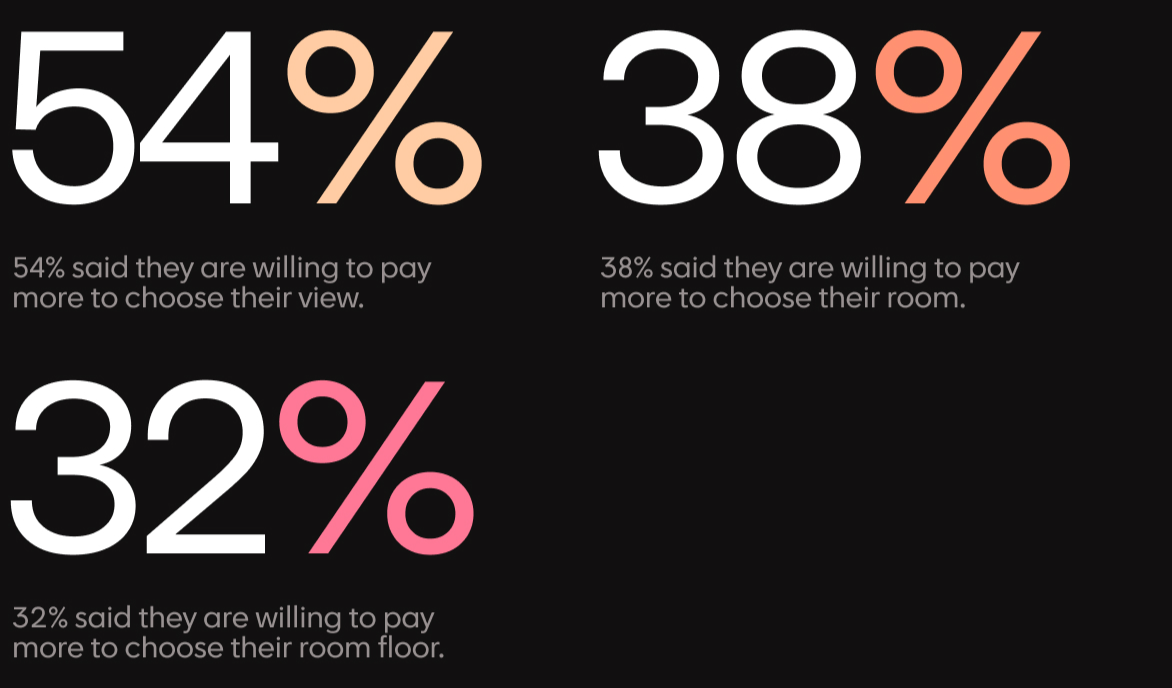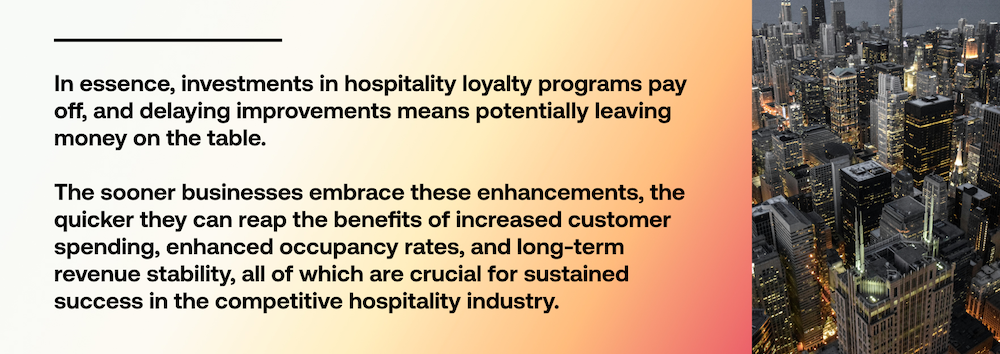Transforming Travel
How Innovative Loyalty Programs Are Reshaping Hospitality

The Evolution of Loyalty Programs in Hospitality
Gone are the days when loyalty programs in the hospitality industry were merely about accumulating points and redeeming them for basic perks. Today, these programs are the architects of lasting memories, playing a pivotal role in solidifying a brand's legacy. They have become instrumental in creating a unique emotional connection with guests, offering personalized amenities like room upgrades, welcome gifts, and exclusive services. This shift has not only led to repeat business but has transformed guests into enthusiastic brand advocates. However, the journey hasn't been without its challenges. Limited perceived benefits, privacy concerns, and complex enrollment processes often deter participation.
Non-Participation and Potential Market
Despite the benefits of loyalty programs, a notable proportion of travelers (58.7%) do not participate in any hotel loyalty programs. This suggests a significant potential market segment that remains untapped and could be targeted with more compelling loyalty offerings. One of the key reasons for this non-participation is that traditional point systems often fail to inspire engagement. Many of the perks offered by hotels can feel impersonal and predictable, leading guests to accumulate points without a sense of immediate satisfaction. In some cases, points expire before being used, resulting in a net loss of satisfaction for the customer. To address this challenge, hotels are rethinking their approach to loyalty programs. Moving beyond the confines of one-size-fits-all point systems. They are evolving from into innovative structures with offers that are emotionally satisfying, experiential, and above all, memorable.
The Future of Hospitality Loyalty Programs: Embracing Reward Variety and Innovation
Traditional point systems are increasingly seen as insufficient to inspire genuine engagement. Almost three-fourths of consumers (74%) now view points as a basic expectation, indicating a need for more innovative approaches to loyalty rewards. As the hospitality industry continues to evolve, there are three key areas of focus that are proving to be particularly impactful in redefining loyalty programs: gamification, smart wallets with digital payments, and strategic partnerships. These areas represent the forefront of innovation in loyalty programs, offering new ways to engage, reward, and retain customers. 

Innovative Reward Structures: Adding Uniqueness and Variety
1. Gamification in Loyalty Programs • Four out of five loyalty program members (81%) appreciate engaging with programs that offer a gamified experience. • Gamification taps into guests’ competitive nature, making loyalty programs more appealing and enjoyable. • Features like earning badges or unlocking higher membership tiers keep guests engaged throughout their journey. • Rewards for interactions such as purchases, referrals, or participation in challenges provide a sense of achievement and instant gratification.
2. Blockchain and Cryptocurrency Integration • Tokenization of Rewards: Traditional points or rewards are converted into digital tokens on a blockchain, stored securely in digital wallets. • Global Accessibility: Cryptocurrencies enable earning and redeeming rewards anytime, anywhere, enhancing the appeal for international customers. • Reduced Costs: Blockchain and cryptocurrencies lower the costs of managing loyalty programs by digitizing transactions and reducing the need for physical materials. • Enhanced Security: The robust security features of blockchain technology ensure the authenticity and integrity of transactions, adding an extra layer of protection.
3. Srategic Partnerships • Hotels are increasingly adopting loyalty models that offer more ways to earn and redeem rewards through partnerships with multiple brands. • These partnerships unlock new opportunities to engage customers in diverse ways, staying ahead of competitors and maximizing customer attention and time. 

From Reward Variety to Personalized Experiences through Unbundling and Upselling
It's important to recognize that offering a diverse range of rewards can also involve breaking up standard offerings. This approach might initially seem contradictory – how can offering less lead to a better experience? The answer lies in the power of personalization. By unbundling standard packages and services, hotels can provide guests with the opportunity to tailor their experiences according to their preferences, creating a perception of enhanced value and personal relevance. In the mind of the guest, this approach to unbundling and upselling is not about reducing the overall offering but about empowering them to choose. It allows guests to pay only for what they truly value, thereby avoiding the one-size-fits-all trap. This ala carte choice enables guests to craft their own unique experiences, making their stay more memorable. Such personalized experiences resonate deeply with guests, as they feel their specific needs and preferences are being acknowledged and catered to.
Unbundling and Upselling: Enhancing the Guest Experience
The concept of unbundling in the hospitality industry is rapidly gaining traction, resonating strongly with consumer preferences. Nearly 90% of consumers express enthusiasm or openness to the idea of unbundling. This trend involves breaking apart components of a booking, allowing guests more control over their stay. It's a strategy that has been successfully implemented in the airline industry and is now making its way into hospitality. According to the American Hotel and Lodging Association (AHLA), a significant portion of consumers are willing to pay extra for personalized options: over half (54%) are willing to pay more to choose their view, 38% to select their specific room, and 32% to choose their room floor. This willingness to pay for personalized experiences underscores the growing demand for customization in the hospitality sector.  Upselling ancillaries to guests provides hotels with a unique opportunity to integrate loyalty program elements more deeply into the guest experience. This approach goes beyond the traditional room booking, encompassing a range of on-property services and experiences. Hotels can offer an array of ancillary services that can be woven into the loyalty program framework. This includes everything from private cooking classes with renowned chefs and premium beach access or cabana rentals to tailored activities for children. By offering these diverse experiences, hotels can cater to the varied interests and needs of their guests, enhancing their overall stay and deepening their connection with the brand. A particularly noteworthy trend is the growing focus on catering to remote workers. The rise of remote work in recent years has blurred the lines between business and leisure travel, giving rise to the concept of "bleisure" travel. This trend sees individuals choosing destinations not just for leisure but also as conducive environments for work. They seek destinations that offer scenic locations, good weather, and opportunities for exploration and relaxation. Hotels can capitalize on this trend by offering amenities and upgrades tailored to the needs of working travelers. This includes comfortable workspaces, high-speed Wi-Fi, and co-working spaces. By creating an environment that supports both work and relaxation, hotels can ensure that their guests have a productive and enjoyable stay, whether it's for a short weekend or an extended period. It also opens up new avenues for revenue generation, as guests are often willing to pay a premium for experiences that align closely with their personal and professional needs.
Upselling ancillaries to guests provides hotels with a unique opportunity to integrate loyalty program elements more deeply into the guest experience. This approach goes beyond the traditional room booking, encompassing a range of on-property services and experiences. Hotels can offer an array of ancillary services that can be woven into the loyalty program framework. This includes everything from private cooking classes with renowned chefs and premium beach access or cabana rentals to tailored activities for children. By offering these diverse experiences, hotels can cater to the varied interests and needs of their guests, enhancing their overall stay and deepening their connection with the brand. A particularly noteworthy trend is the growing focus on catering to remote workers. The rise of remote work in recent years has blurred the lines between business and leisure travel, giving rise to the concept of "bleisure" travel. This trend sees individuals choosing destinations not just for leisure but also as conducive environments for work. They seek destinations that offer scenic locations, good weather, and opportunities for exploration and relaxation. Hotels can capitalize on this trend by offering amenities and upgrades tailored to the needs of working travelers. This includes comfortable workspaces, high-speed Wi-Fi, and co-working spaces. By creating an environment that supports both work and relaxation, hotels can ensure that their guests have a productive and enjoyable stay, whether it's for a short weekend or an extended period. It also opens up new avenues for revenue generation, as guests are often willing to pay a premium for experiences that align closely with their personal and professional needs.
 Upselling ancillaries to guests provides hotels with a unique opportunity to integrate loyalty program elements more deeply into the guest experience. This approach goes beyond the traditional room booking, encompassing a range of on-property services and experiences. Hotels can offer an array of ancillary services that can be woven into the loyalty program framework. This includes everything from private cooking classes with renowned chefs and premium beach access or cabana rentals to tailored activities for children. By offering these diverse experiences, hotels can cater to the varied interests and needs of their guests, enhancing their overall stay and deepening their connection with the brand. A particularly noteworthy trend is the growing focus on catering to remote workers. The rise of remote work in recent years has blurred the lines between business and leisure travel, giving rise to the concept of "bleisure" travel. This trend sees individuals choosing destinations not just for leisure but also as conducive environments for work. They seek destinations that offer scenic locations, good weather, and opportunities for exploration and relaxation. Hotels can capitalize on this trend by offering amenities and upgrades tailored to the needs of working travelers. This includes comfortable workspaces, high-speed Wi-Fi, and co-working spaces. By creating an environment that supports both work and relaxation, hotels can ensure that their guests have a productive and enjoyable stay, whether it's for a short weekend or an extended period. It also opens up new avenues for revenue generation, as guests are often willing to pay a premium for experiences that align closely with their personal and professional needs.
Upselling ancillaries to guests provides hotels with a unique opportunity to integrate loyalty program elements more deeply into the guest experience. This approach goes beyond the traditional room booking, encompassing a range of on-property services and experiences. Hotels can offer an array of ancillary services that can be woven into the loyalty program framework. This includes everything from private cooking classes with renowned chefs and premium beach access or cabana rentals to tailored activities for children. By offering these diverse experiences, hotels can cater to the varied interests and needs of their guests, enhancing their overall stay and deepening their connection with the brand. A particularly noteworthy trend is the growing focus on catering to remote workers. The rise of remote work in recent years has blurred the lines between business and leisure travel, giving rise to the concept of "bleisure" travel. This trend sees individuals choosing destinations not just for leisure but also as conducive environments for work. They seek destinations that offer scenic locations, good weather, and opportunities for exploration and relaxation. Hotels can capitalize on this trend by offering amenities and upgrades tailored to the needs of working travelers. This includes comfortable workspaces, high-speed Wi-Fi, and co-working spaces. By creating an environment that supports both work and relaxation, hotels can ensure that their guests have a productive and enjoyable stay, whether it's for a short weekend or an extended period. It also opens up new avenues for revenue generation, as guests are often willing to pay a premium for experiences that align closely with their personal and professional needs.Harnessing the Power of AI in Loyalty Programs
The integration of AI and machine learning in loyalty programs is revolutionizing customer data analysis and usage. These technologies enable the creation of hyper-personalized offers and more diverse reward structures. A notable example from iSeatz, who mapped loyalty member data with transaction data on a travel rewards platform: members who frequently used the platform to earn and redeem points on rewards like car rentals, tours, and activities had a five times higher 10-year average customer value. They booked eight times more frequently, with 50% fewer cancellations, and spent ten times more on core products. This data underscores the immense value and potential of integrating AI into loyalty programs to enhance customer engagement and profitability.
The Lucrative Payoff of Investing in Hospitality Loyalty Programs
Hospitality loyalty programs are not just a tool for customer engagement; they’re an avenue for creating significant ROI and revenue. Their impact is multifaceted, affecting both direct and indirect revenue streams while also offering cost-effective marketing solutions. Key highlights demonstrating the financial benefits of these programs include:
1. Influence on Consumer Choice: 60% of travelers prefer hotels with loyalty programs, indicating a strong influence on hotel selection.
2. Room Booking Dominance: Loyalty members account for over 59.2% of room nights booked in major hotel chains, showcasing their critical role in driving consistent business.
3. Increased Customer Spending: Members of loyalty programs spend an average of 39% more than non-members, contributing significantly to higher revenue.
4. Impact on Occupancy Rates: These programs notably affect occupancy rates, particularly during off-peak seasons, by encouraging bookings through special offers or points redemption.
5. Indirect Revenue Generation: Loyalty programs foster revenue growth indirectly through word-of-mouth and referrals from satisfied customers.
6. Enhanced Customer Lifetime Value: By promoting repeat business, loyalty programs increase the lifetime value of customers, contributing to sustained revenue over time.
7. Long-Term Revenue Stability: The establishment of a repeat customer base through loyalty programs aids in long-term revenue stability, crucial for future planning and investment.
8. Revenue from Data Utilization: The data gathered from loyalty programs is invaluable for crafting personalized marketing strategies and service offerings, leading to increased revenue. 

Conclusion
The transformation of loyalty programs in the hospitality industry marks a significant shift from traditional point-based systems to dynamic, personalized experiences that resonate deeply with guests. These programs have evolved into powerful tools that not only foster emotional connections but also significantly contribute to a brand's legacy and financial success. The journey towards more innovative loyalty programs addresses the challenges of non-participation and the untapped potential market. By moving away from predictable perks and towards more engaging, emotionally satisfying, and memorable experiences, hotels are redefining what it means to be loyal. This shift is not just about offering more choices but about providing personalized experiences that allow guests to craft their own unique stays, enhancing their overall satisfaction and deepening their connection with the brand. The focus on unbundling and upselling, coupled with the integration of advanced technologies like AI, blockchain, and strategic partnerships, is creating new avenues for guest engagement and revenue generation. These innovative approaches are reshaping the hospitality landscape, offering guests more than just a transactional relationship with their preferred brands. As the industry continues to evolve, the importance of adapting and enhancing loyalty programs becomes increasingly evident. The investment in these programs is not just a commitment to guest satisfaction but a strategic move toward long-term financial stability and growth. The longer hotels wait to innovate their loyalty programs, the more they risk leaving potential revenue and customer loyalty on the table. To view the full list of references, Click Here. Thank you for your interest in our paper. Happy reading!